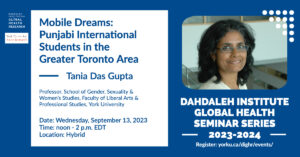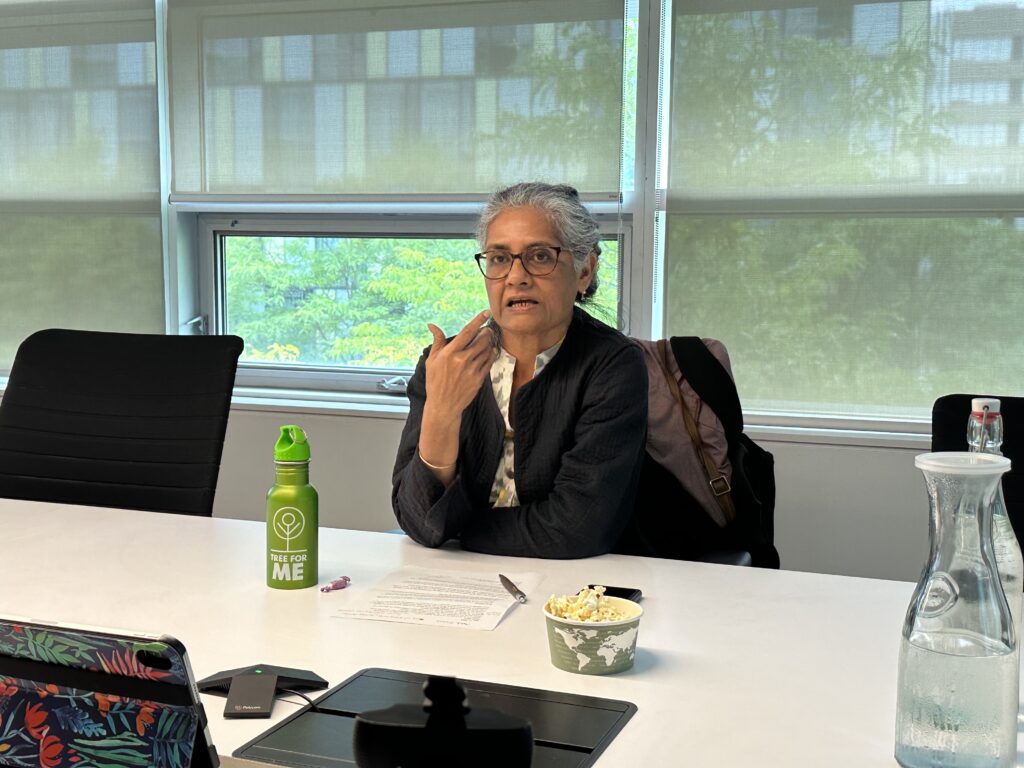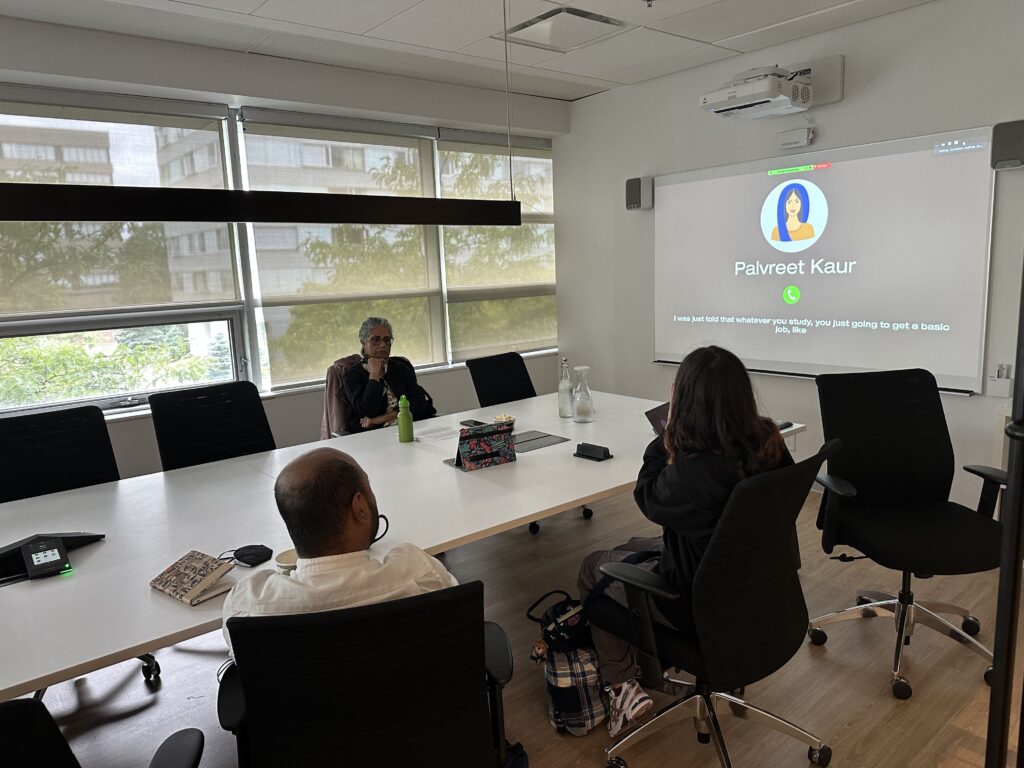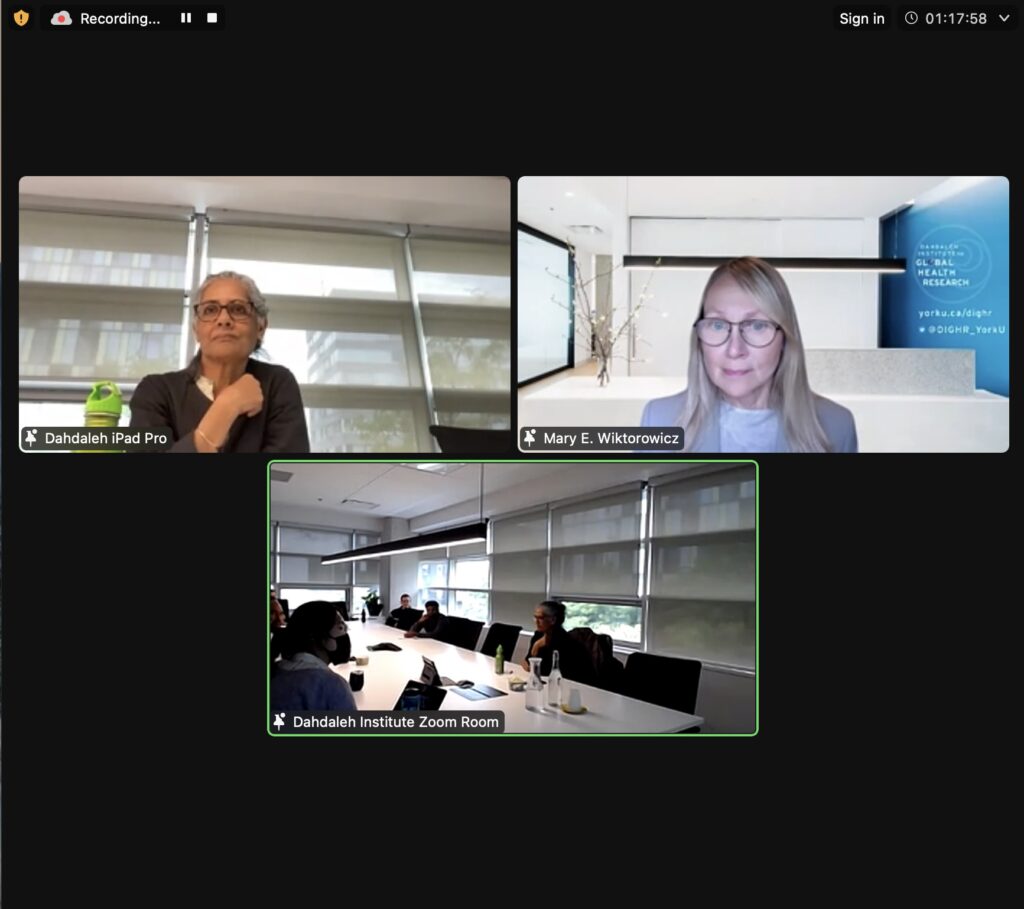Post
Published on September 29, 2023

As part of the 2023-2024 Dahdaleh Seminar Series, on September 13, 2023, Professor Tania Das Gupta (Faculty of Liberal Arts & Professional Studies, York University) presented her documentary film titled, Mobile Dreams: Punjabi International Students in Toronto to over 30 attendees at the screening. The one-year exploratory research project was funded by the Social Sciences and Humanities Research Council (SSHRC). Using interviews, the film touches upon five main themes beginning from the arrival to Canada of the Punjabi international students in the Peel Region (e.g., Brampton), Ontario.
- Securing Employment
Universities and colleges charge international students tuition fees that are roughly four times higher than domestic students, yet they are ineligible for health and social services. Unfortunately, they are also restricted to working only 20 hours per week and experience difficulty finding jobs. A few of the interviewees shared that they were able to find jobs through a close friend or an acquaintance. They often work in food delivery, restaurants or as truck drivers, and security guards with little pay.
- The Impact of COVID-19
International students had a different experience to the COVID-19 pandemic. While some students worked in essential jobs in health care as nurses. Others who had to work from home or study from home experienced many challenges living in a small, shared space. Many reported feeling isolated since students were not able to access university resources, and to build an essential support network. One interviewee stated, “So sitting at home, stuck for the entire day in a basement, I was in depression…” This made the transition into Canada more difficult.
Baldev Mutta (Punjabi Community Health Services) reported that they are seeing a rise in mental health issues among new immigrants. The rise in mental health issues also aligns with the rise of the opioid crisis.
- The Role of the Community
The international students experienced hostility from the parents of Punjabi-Canadians who believed that international students were stealing jobs from their children because the international students were recognized to be more independent, hardworking, and educated than Punjabi-Canadians that can rely on their parents. Manvir Bhangu (Laadliyan) states that there is “this binary of us versus them, and I think they don’t see us [Canadian citizens] as allies.” It makes it difficult to build a rapport when this narrative still exists.
- Finding Housing
The interviewees all mentioned difficulties finding safe, affordable housing and have had experiences where landlords take advantage of these students. They would rent small spaces to multiple students. Sometimes these rooms are bedbug infested and not suitable for living. Landlords have also been known to threaten students with eviction in the past or withhold the passports and place other restrictions to control these students.
One student expressed, “It’s like they are comparing us to animals. So you see an ad and they specifically mention ‘only Punjabi girls’ or ‘only Gujarati girls’ or ‘no students allowed’, ‘only vegetarians.’ These kinds of racism and sexism exist here.”
- Dreams and Future Aspirations
Many international students hope to settle down in Canada after they have completed their schooling and obtain permanent residency. The documentary ends with the international students discussing their future aspirations like becoming a nurse, working in social services, buying a house, and pursuing higher education.
Mobile Dreams depict the very harsh realities of the challenges international students face, but also their hopes for a better life in Canada. As highlighted by the film editor, Pradeepto Roy, many international students are willing to withstand unfair circumstances because they believe in order to achieve their goals and to settle into Canada, they must overcome challenges.
Watch the seminar presentation below:
Connect with Tania Das Gupta
Themes | Global Health & Humanitarianism |
Status | Active |
Related Work |
N/A
|
Updates |
N/A
|
People |
N/A
|
You may also be interested in...
Check out the SWOT at the UNC Water and Health Conference
The Safe Water Optimization Tool (SWOT) team will be at the upcoming UNC Chapel Hill Water and Health Conference, October 24 to 28, at the University of North Carolina Chapel Hill. James Brown, our field technical ...Read more about this Post
Recap – From Dreams to Impact: Dr. Firdosi Mehta's Journey with the World Health Organization
On April 3rd, 2024, Dahdaleh adjunct faculty fellow Dr. Firdosi Mehta shared his remarkable journey in the field of public health across six diverse countries. With a career that spans several continents, Dr. Mehta's narrative ...Read more about this Post
Recap — A Discussion on Conflict, Humanitarianism, and the Call for a Canadian Peace Museum, with Chris Houston
On October 2, 2024, Dahdaleh community fellow Chris Houston delved into the complexities surrounding war, humanitarianism, and peace. He began by highlighting the International Day of Peace, emphasizing the importance of peace as a fundamental ...Read more about this Post



